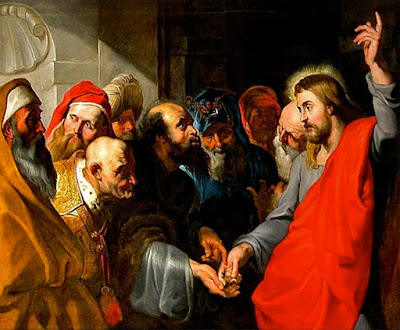 Yesterday, we celebrated the martyrdom of Peter and Paul, both martyred in Rome, perhaps even on the same day. Peter and Paul were martyred, likely in the year 67, but they were not the first martyrs of Rome.
Yesterday, we celebrated the martyrdom of Peter and Paul, both martyred in Rome, perhaps even on the same day. Peter and Paul were martyred, likely in the year 67, but they were not the first martyrs of Rome.There were Christians in Rome within a dozen or so years after the death of Jesus; it is to them that Paul wrote his great letter to the Romans.
Little can be said with certainty about the social and economic situation of those original Roman Christians; they probably represented a cross-section of Rome’s urban population. It was probably a congregation consisting mostly of folks from the middle and lower classes—artisans, merchants, manual laborers, slaves and former slaves, with perhaps a modest number of affluent citizens and perhaps a one or two politically influential persons. They were probably a combination of Jewish and Gentile—Paul even refers to a few of his relatives in his letter, Prisca and Aquila.
Rome was somewhat tolerant to its Jewish citizens. They were exempt from offering the pagan sacrifices. As a foreign religion, some Romans viewed Judaism with disdain. Cicero, for example, referred to Judaism as a barbarous superstition. He did not consider it dangerous, merely uncultured.
So, when some of those Roman Jews and a handful of Gentiles become Christian, it probably didn’t cause much concern, as it did in Jerusalem. Perhaps, as time went on, rumors of the Christians claim that Christ was King and true God began to cause some concern in the imperial palace.
In July of 64 A.D., more than half of Rome was destroyed by fire. Rumor blamed the tragedy on the Emperor Nero, who wanted to enlarge his palace. He, in turn, shifted the blame off of himself by accusing the Christians. And so Nero ordered their arrest and execution. Christians were rounded up, many were tortured, some were even crucified or thrown to wild beasts or burned at the stake.
The 1st century roman historian Tacitus wrote about the incident, “great multitudes of Christians were put to death”. Even Tacitus suggests that Nero made the Christians scapegoats for the fire.
Nero's was the first persecution by a Roman emperor, but certainly not the last. But we celebrate and commemorate today those who were killed by that persecution, for their association with Christ. For their witness which must have impacted the early Church profoundly and continues to bolster our faith, 2000 years later.
“Blessed are those who are persecute you, and insult you, and utter every kind of evil against you falsely because of me, rejoice and be glad, for your reward is the kingdom of heaven.” As the world continues to oppose and conspire against Christ, against his Church, and against Christians, may we be counted among his friends, his disciples, his brothers and sisters. For the glory of God and salvation of souls.
That our bishops and clergy may be zealous in preaching and teaching the truth of the Gospel, and that our future bishop of the diocese of Cleveland may be a man of true faith and the Holy Spirit.
That people of faith remain vigilant in defending their religious liberty and that Christ may govern the minds and hearts of those who govern us. We pray to the Lord.
That we may never allow the witness of the martyrs to be in vain, but live lives worthy of their sacrifice.
For all the needs of the sick and the suffering, the homebound, those in nursing homes and hospitals, the underemployed and unemployed, victims of natural disaster, war, and terrorism, for all Christians persecuted for their faith around the world, for all those who grieve the loss of a loved one, and those who will die today, for their comfort, and the consolation of their families.
For the repose of the souls of our beloved dead, for all of the poor souls in purgatory, for the deceased members of our families, friends, and parish, and for Richard Behlke & Catherine Strauss for whom this Mass is offered.
Heavenly Father, graciously hear the prayers of your pilgrim Church on this feast of the Roman Martyrs, through Christ, Our Lord.













